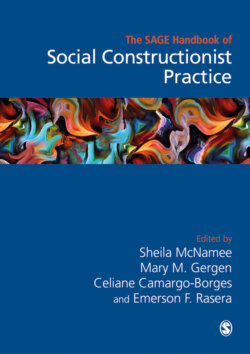Читать книгу The Sage Handbook of Social Constructionist Practice - Группа авторов - Страница 118
На сайте Литреса книга снята с продажи.
References
ОглавлениеAnderson, Harlene (1997). Conversation, language and possibilities: A postmodern approach to therapy. New York: Basic Books.
Anderson, Harlene (2009). Collaborative practice: Relationships and conversations that make a difference. In J. Bray and M. Stanton (Eds.), The Wiley handbook of family psychology (pp. 300–313). New York, NY: Wiley.
Anderson, Harlene (2012). Collaborative practice: A way of being ‘with’. Psychotherapy and Politics International, 10, 1002.
Anderson, Harlene (2013). Collaborative learning communities: Toward a postmodern perspective on teaching and learning. In B. J. Irvy and G. Brown (Eds.), Handbook of educational theories (pp. 515–527). Charlotte, NC: Information Age Publishing.
Anderson, Harlene (2014). Collaborative dialogue-based research as everyday practice: Questioning our myths. In G. Simon, and A. Chard (Eds.), Systemic inquiry: Innovation in reflexive practice research (pp. 60–73), Farnhill, UK: Everything is Connected Press.
Blair, Madelyn (2011). Essay in two voices. Baltimore, MD: Pelerei, Inc.
Bodiford, Kristin and Camargo-Borges, Celiane (2014). Bridging research and practice: Designing research in daily practice. AI Practitioner, 16(3), 4–8.
Browne, Bliss (1998). Lessons from the field: Applying appreciative inquiry (S. Hammond and C. Royal, Eds.). Plano, TX: Practical Press, Inc.
Browne, Bliss (2002). Cultivating hope and imagination. Journal of Future Studies, 7(1), 115–134.
Browne, Bliss (2005). Imagine Chicago: Cultivating hope and imagination. In C. Newnes and N. Radcliffe (Eds.), Making and breaking children's lives (pp. 151–168). UK: PCCS Books.
Browne, Bliss (2009). An inspired future: The significance of city-wide conversations in Chicago. AI Practitioner, 11(2), 28–33.
DeFehr, Janice (2008). Transforming encounters and interactions: A dialogical inquiry into the influence of collaborative therapy in the lives of its practitioners. Doctoral dissertation. Retrieved from www.taosinstitute.net.
DeFehr, Janice (2009). Incarnating Dialogic Social Inquiry: Embodied engagement, sensation, and spontaneous mutual response. Paper for a workshop, Constructing Worlds Conference, Copenhagen, August 23, 2009.
DeFehr, Janice (2017a). Navigating psychiatric truth claims in collaborative practice: A proposal for radical critical mental health awareness. Journal of Systemic Therapies, 36(3), 27–38.
DeFehr, Janice (2017b). Bodily, in a ‘Living’ way. International Journal of Collaborative-Dialogic Practices, Special Issue, 7(1), 13–15.
DeFehr, Janice et al. (2012). ‘Not-Knowing’ and ‘assumption’ in Canadian social services for refugees and immigrants: A conversational inquiry into practitioner stance. International Journal of Collaborative-Dialogic Practices, 3(1), 75–88.
Gergen, Kenneth (2014). Pursuing excellence in qualitative inquiry. Qualitative Psychology, 1(1), 49–60.
Gergen, Kenneth (2015). From mirroring to world-making: Research as future forming. Journal for the Theory of Social Behaviour, 45, 287–310.
Hoffman, L. (2007). The art of ‘withness’: A new bright edge. In H. Anderson, and D. Gehart (Eds.), Collaborative therapy: Relationships and conversations that make a difference (pp. 73–79). New York: Routledge.
Lizama Valladares, Christian (2013). Lo infiel: diálogos sobre la construcción de la infidelidad. Tesis para obtener la Maestría en Psicoterapia. Instituto Kanankil, Mérida, Yucatán, México.
McNamee, Sheila (2015). Radical presence: Alternatives to the therapeutic state. European Journal of Psychotherapy & Counselling, 17(4), 373–383.
McNamee, Sheila (2018). Far from ‘anything goes’: Ethics as communally constructed. Journal of Constructivist Psychology, 31, 361–368.
McNamee, S. and Hosking, D. M. (2012). Inquiry as engaged unfolding. In Research and social change: A relational constructionist approach (pp. 63–86). New York: Routledge.
Seikkula, J. (2002). Monologue is the crisis – dialogue becomes the aim of therapy. Journal of Marital and Family Therapy, 28, 283–284.
Seikkula, Jaakko (2003). Dialogue is the change: Understanding psychotherapy as a semiotic process of Bakhtin, Voloshinov, and Vygotsky. Human Systems: The Journal of Systemic Consultation and Management, 14(2), 83–94.
Seikkula, Jaakko et al. (1995). Treating psychosis by means of open dialogue. In S. Friedman (Ed.), The reflecting team in action: Collaborative practice in family therapy (pp. 62–80). New York: Guilford.
Shotter, John (2008). Conversational realities revisited: Life, language, body and world. Chagrin Falls: Taos Institute.
Shotter, J. (2010). Social construction on the edge: Withness thinking & embodiment. Chagrin Falls: Taos Institute.
Sisto, Vicente (2008). La investigación como una aventura de Producción dialógica: La relación con el otro y los criterios de validación en la Metodología cualitativa contemporánea. In Psicoperspectivas. CL: Individuo y Sociedad, Volumen VII, año 2008.
Sosa Infante, Cynthia (2013). Ser mujer: diálogos intergeneracionales. Tesis para obtener la Maestría en Psicoterapia, Instituto Kanankil, Mérida, Yucatán, México.
Torres Báez, Lilia Carolina (2016). Conversaciones familiars alrededor de la discapacidad. Tesis para obtener la Maestría en Psicoterapia, Instituto Kanankil, Mérida, Yucatán, México.
